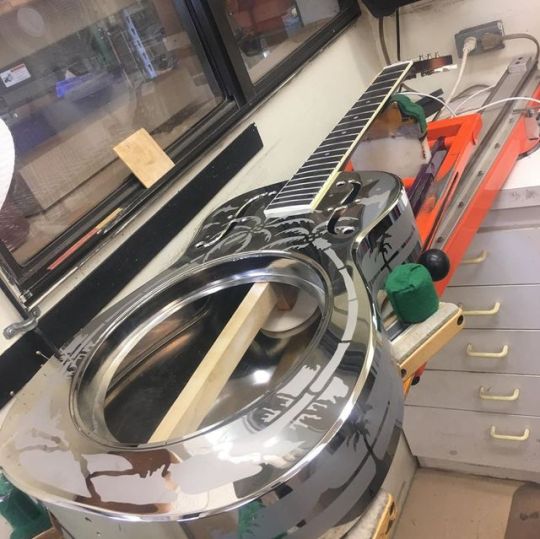#paulrishell
Explore tagged Tumblr posts
Photo

Swell visit with the fine folks at The National Guitar factory yesterday.....played various guitars for a few hours. #guitarheaven #guitarists_heaven #nationalguitars #nationalresophonic #rlburnside #mississippifredmcdowell #catfishkeith #sararogo #davearcari #frankstokes #reverendgarydavis #mississippijohnhurt #tajmahalblues #kebmo #stefangrossman #paulrishell #robertjohnson #lightninghopkins #california #bottleneckslide #bukkawhite #kimbroughcottonpatchbluesfestival #juniorkimbrough #sonhouse #bigbillbroonzy #mancelipscomb #tomfeldmann #charliepatton #johnleehooker #josephspence #zztop #markknopfler #busterjones #jerryreed #blindwilliejohnson #skipjames #johnnycash #resonatorguitar #resophonic #resophonicguitar #countryblues #hillcountryblues (at National Reso-Phonic Guitars) https://www.instagram.com/p/BxU6GkxnZb7/?igshid=1oi2g5zxxrl0l
#guitarheaven#guitarists_heaven#nationalguitars#nationalresophonic#rlburnside#mississippifredmcdowell#catfishkeith#sararogo#davearcari#frankstokes#reverendgarydavis#mississippijohnhurt#tajmahalblues#kebmo#stefangrossman#paulrishell#robertjohnson#lightninghopkins#california#bottleneckslide#bukkawhite#kimbroughcottonpatchbluesfestival#juniorkimbrough#sonhouse#bigbillbroonzy#mancelipscomb#tomfeldmann#charliepatton#johnleehooker#josephspence
0 notes
Text
Artist Center Stage: Paul Rishell

Artist and Country-Blues guitar teacher at the Passim School of Music Paul Rishell was Born in Brooklyn, New York in 1950. At the age of 13, captivated by a recording of Son House singing “County Farm Blues,” Rishell began a lifelong study of pre-war blues and its progenitors. He moved to Cambridge, Massachusetts in the early 1970s and began to perform with and learn from blues greats such as Son House, Johnny Shines, Sonny Terry, Brownie McGhee, Howlinʼ Wolf, John Lee Hooker, and Buddy Guy. He paired up with harmonica virtuoso (and fellow Passim School instructor) Annie Raines in 1992 and together they have recorded 5 albums including the award-winning Moving to the Country. Rishellʼs original music has been used in plays, films, and countless television shows including Friends, Oprah, and A&Eʼs Biography. After nearly 50 years of practicing his craft, he is a treasure trove of American roots music history and techniques, which he shares in performance, in his instructional video “Dirt Road Blues,” (Truefire) and on his new CD Talking Guitar. He is now passing the torch to the next generation as a Visiting Artist at Berklee College of Music, and teaching a Country-Blues guitar class at The Passim School of Music. We caught up with Paul this week to hear what he’s about and what keeps him coming back to the Passim community.
So, why Country-Blues guitar?
Country blues guitarists of the 1920’s and ’30’s were called upon to come up with a kind of music that would address the people’s desire to dance. They contrived a poly-rhythmic approach to the guitar by using complex finger picking patterns and a variety of open tunings that would enable a single performer to provide music that would satisfy that desire. I am drawn to the individuality, creativity and independent nature of this music. It is more fun for me to play and sing than any other style.
Looking back on such a long line of accomplishments, can you name an event that occurred in your music career that has helped shape you as a musician?
My first wife Leslie was a huge influence on my life. From the first time she heard me play, she was 100% in my corner. She encouraged me and always supported and advised me on my career. She became my manager and was in the house the night Annie Raines came to sit in with me. She was blown away by Annie and strongly encouraged Annie and I to form a musical partnership. Tragically, she died of cancer in 1996.
What’s your favorite thing about teaching music?
The look on peoples’ faces when they “get it.”
What draws you to the stage?
I like to perform material from a very different time and place and see how people respond to it today. It’s amazing how timeless good music is.
What brought you to Club Passim?
I started playing out as a solo performer in 1975. I got some of my first solo gigs as an opener there. At first they would put me on before singer songwriters like John Prine or Jesse Winchester. Eventually I started opening for blues acts when they come into town. I did lots of shows with Sonny Terry & Brownie McGhee there.
What has been your favorite Club Passim moment?
Sitting around the dressing room with Sonny Terry talking about the old days and playing a few Blind Boy Fuller tunes with him.
What do you see for the future of your musical endeavors?
More recording, more teaching, more traveling, more fun!
#passim#clubpassim#paulrishell#folkmusic#rootsmusic#passimschoolofmusic#countryblues#guitar#acoustic#cambridge#harvardsquare#massachusetts#boston#americana#bluesmusic#annieraines#movingtothecountry#talkingguitar#dirtroadblues
1 note
·
View note